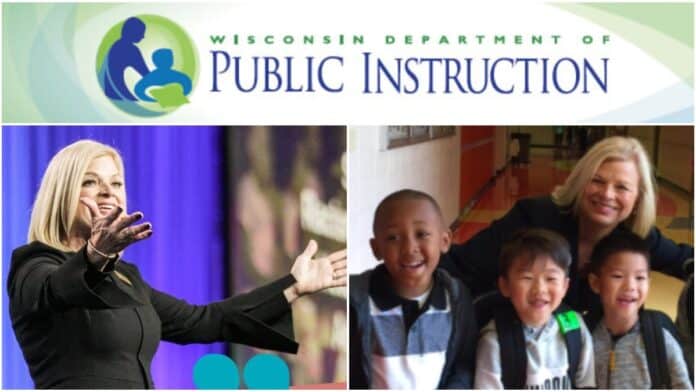If she wins today, Brown Deer Schools Superintendent Deb Kerr will be a lot of firsts. The first state school superintendent in Wisconsin history not endorsed by the teacher’s union, which she thinks has an unhealthy stranglehold on the state Department of Public Instruction, putting teachers before kids and parents.
She would be the first Wisconsin state school superintendent who supports school choice. She would be the first from the Milwaukee area. She thinks all schools should be teaching students in person, and the fact they’re not is worsening achievement disparities.
“We’ve got to get back to school. These kids are going to be years behind,” she says.
You wouldn’t know it from the media, which has focused on a lot of sideshows in a race that has seen Kerr’s opponent wildly outspend her due to an influx of cash from the teacher’s union, Democratic party, and other liberal interests, including those who oppose school choice. There’s no question about it: Jill Underly is the teacher’s union’s favorite candidate. There’s no question that school choice advocates prefer Kerr.
We interviewed Kerr on election eve to get a sense of where she stands on the issues in the race for a seat once held by Tony Evers before he was elected governor.
The election is on Tuesday, April 6.
This is a candidate who supported Act 10, is pro-life, and opposes Common Core and critical race theory in the classroom.
The state school superintendent is in charge of “all children,” and she wants all schools public and private in “one system of accountability and transparency and equitable access. No one has brought parties to the table.” She says that 80 percent of black parents “are favorable to school choice. Neighborhood public schools are not serving them well.” (In fact, Kerr has received support from black leaders who support school choice.)
“Everybody wants their kids back in school,” she says. “We are losing a generation of kids if we don’t get back to school.”
While school choice is definitely a key issue and bellwether in the race – Kerr supports lifting caps on voucher schools, Underly wants no expansion – the focus on it and other hot-button issues obscure what is probably the biggest difference between the two candidates: The experience and achievement gap between Kerr and Underly.
Kerr has a total of 40 years in education, including 21 years as superintendent of public rural and suburban districts, in contrast, to Underly who has over 20 years of education experience, including 6 years as the superintendent of the Pecatonica School District.
Some of Kerr’s other experience includes:
- Co-Chair of the UW System Task Force
- To Advance Teachers and Leaders into the Pipeline
- President of National and State Superintendent Associations
- The School Superintendents Association (AASA) and Wisconsin Association of School District Administrators (WASDA)
- Adjunct Professor at Local Universities
- Champion of Excellence and Equity for ALL Students
- Mentor and Advocate for Women Leaders
- Founding Member of Women Leading Wisconsin
- Coach of Back-to-back Girls Varsity Basketball State Championships
A story not oft-told: Kerr worked to narrow achievement disparities between students of color and white students in her home school district by hiring reading specialists and adding character education to the curriculum. The result: A nearly 100% graduation rate in a district surrounded by those where far fewer walk across the stage.
Despite the media’s focus on Republicans like former Gov. Scott Walker and school choice advocates supporting Kerr, she is hard to peg politically. She says she is a moderate Democrat, but she has “conservative values,” noting that she has always been fiscally conservative. Underly comes across as unabashedly liberal, and she was skewered on Milwaukee black talk radio for sending her own kids to private schools because she had the money, while denying black and other parents the same option.
Kerr said she also believes strongly in equity issues but differs from Underly on how to get there. Whereas Underly talks about funding and buildings, Kerr talks about closing reading gaps and character education. She has presided over an extremely diverse school district in the Milwaukee metropolitan area, whereas Underly has fewer years of experience in what Kerr points out is an almost entirely white rural district.
When you boil it down, Kerr supports giving parents more options for their children’s schooling. She wants to take schools back to the basics with a strict focus on phonics and math.
“I do believe in education reform,” she says, “and keeping property taxes low. I have a proven track record and the most experience – 40 years in education.”
She wants to “get the unions out of the DPI and get back to the basics, teaching phonics, math, counting; that’s what it’s going to take to get improvement and growth.”
Here are some of her other statements and positions, during the interview with us:
Closing the Achievement Gap in Brown Deer
Kerr said that over the 13 years she has been superintendent in Brown Deer, the district has become more diverse. At first, students were coming into 9th grade with 5th-grade reading levels. “It was shocking,” she says. “You would think when you’re in high school, you should be able to read.” She and a high school principal decided they needed to “do something different,” so they hired three reading specialists at the high school.
“That’s what kids needed – targeted intervention to build the capacity to be proficient readers.” She said that the strategies proved successful. The gap between white and non-white students shrank. “We were almost at a 100% graduation rate.”
When they noticed that they were suspending “black kids five times the amount of white kids,” they realized there was a problem, so they created “character education” classes, to teach things like respect, tolerance and responsibility, “values and virtues kids were not getting at home.” The program won a national award. “We were creating this new culture and climate where kids felt a sense of belonging.”
In contrast, Underly “has no experience in working in diverse school districts. Our problems are so complex; the state needs someone like me who has been in the context of it.” She doesn’t want to “throw money at an old problem.”
Kerr stressed that she supports “equity.” In Brown Deer, she said, she spoke out when students were called the N-word at a football game.
“They were just expected to take it,” she said. “I was tired of it. I spoke out and advocated for them. It was not acceptable. I called it out.”
She also created a harassment and discrimination policy. Kerr also believes there needs to be more diverse teachers in classrooms, so students are taught by people who look like them.
Deb Kerr Doesn’t Support Critical Race Theory
However, she does not support critical race theory in the classroom, saying, “No, absolutely not, we never talked about that in Brown Deer, which is one of the most diverse school districts in the state.” She said it’s important to “get ideology out of curriculum.”
Wants the Pledge of Allegiance Said Every Day
Kerr said she wants students taught the “values and virtues of the Constitution,” including “making sure we say the Pledge of Allegiance every day.” She wants to “teach the American dream and history of our country.” She wants students to be “proud to be American.”
On Partisanship in the Race
“This is a non-partisan race. Our kids are not partisan. They don’t wear red-and-blue jackets.”
She said she has the support of the Wisconsin Republican Party, but she has “always worked well with people across the aisle,” saying she has worked with Democrats like Lena Taylor (who endorsed her) as well as Republicans like Alberta Darling. She was recently endorsed by Democrat Arne Duncan, who was President Obama’s education secretary. Yet she has financial backing from some conservative heavyweights like billionaire Diane Hendricks.
On Why Attack Ads Will Backfire
She thinks the attack ads running against her from Democrats will “backfire on them” because people are “politically fatigued” and get-out-the-vote efforts could carry the day.
On Why Democrats Poured So Much Money Into the Race
“They know I can win,” she said, noting that she was only 2,650 votes under Underly during the primary.
On Honoring Parental Choice
“If parents want their children to be in school choice, it’s important, and we need to honor that choice,” she said. “In four years these caps come off and that’s the law, vouchers are here to stay. Let’s quit arguing and cut the toxic rhetoric and do what our kids need.”
She added, “High tides raise all votes.”
As for raising caps on the number of children allowed into publicly funded voucher schools, she says, “yes, absolutely,” but notes it’s “not in my purview.”
In-Person Schooling in a Pandemic
She is troubled that some of the state’s five largest districts stuck with virtual schooling. She believes this has created a racial disparity.
The Challenges of Rural School Districts
She believes that rural schools “have similar challenges with urban schools – poverty, robust Internet, attracting high-quality staff.” She wants to do a compensation analysis because “rural kids deserved as good of teachers” and wants to build partnerships to foster “more robust internet access.”
Deb Kerr adds, “I would like to look at funding to help those school districts dealing with more kids poverty and dealing with special needs.”
Transgender Athletes Competing in Women’s Sports
She said that the state school superintendent doesn’t have any control over transgender sports participation, which falls under the authority of the WIAA and Legislature. She calls it a “very complex and nuanced situation,” but notes, “I’m a girl of Title 9. I was a collegiate athlete. I played sports all of my life. I want to compete against other women.”
On Underly’s Name Calling
“It’s unfortunate. I resent the fact my opponent continues to do namecalling. I was called a liar, a racist, a transphobic, an insurrectionist,” she said, adding that she is none of those things. She said that Underly had “basically called all conservatives and Republicans transphobic.”
On Teaching Reaching
Deb Kerr believes there “hasn’t been enough access and opportunity with all kids,” noting that Wisconsin schools are “teaching reading 400 different ways.
Alternative Methods for Teaching Licenses
Deb Kerr says she was instrumental in the passage of an alternative teaching license law because it was so hard to find business and technical education teachers. Deb Kerr believes that work-based experience should count, explaining an example where she had a tech ed teacher with an economics degree who had worked as a carpenter but didn’t have teacher licensing. He became “one of the most successful tech ed teachers in the state.”
She is a supporter of teaching more students about trades.
The Pandemic
She said a lot of parents transferred their kids to private schools during the pandemic because they offered in-person classes. If elected, she wants to make sure that DPI provides resources to “all of these schools to reopen safely and sensibly.” She said that 70% of schools have been open since Sept. 1, mostly in rural areas.
She believes “students are not spreaders” of COVID and schools can safely open even without every teacher being vaccinated.
Deb Kerr believes the lack of in-person schooling has “exacerbated” the achievement gaps and says parents are “frustrated and angry,” saying she knows some who had to quit their jobs because their kids were in virtual learning. “It’s an equity issue.”
Should all schools open full-time in person? “Absolutely. The data shows we can do it.”
Common Core
“I would like to see Common Core eliminated. It’s a very low expectation. I want to get rid of Common Core. It’s a federal mandate.” She would advocate for that change.
Supporting Act 10
Asked whether she supported Act 10, she said “absolutely. We needed every tool we could get in Brown Deer to balance our budget and keep teachers in their positions without laying them off.”
The union was blocking a change in an insurance policy that would have kept the same policies and deductibles but saved hundreds of thousands of dollars, and a plan to have teachers “give us 30 more minutes of time a day so they could work together.”
The teacher’s union “held it hostage” until Act 10 allowed these changes, she said.
“I supported Gov. Walker, and he supports me,” she said. “I voted for him, especially during the recall, which was a serious waste of taxpayer money.”
On the Teacher’s Union
“It’s a travesty that the adults in the unions are given all of the consideration. Look what’s happened during the pandemic; they keep changing the goalposts…kids and families are suffering. Teachers have done a heroic job, but we have to think of kids and families first.”
“We’ve got to get back to school. These kids are going to be years behind.”
On How the Media Treated Her
Deb Kerr called the media “fake and unfair.”
She said she had a “complicated issue with a business manager” but the media failed to run a supportive press release and she had a “school board that stood behind me the entire time.”
She said her own community in Milwaukee “would not even give me the benefit of the doubt.” She said that’s because of the dominance of the teacher’s union.
Deb Kerr On Making DPI More Consumer-Friendly
She wants to have a “regional approach, get more boots on the ground. DPI has not been a customer service-friendly organization. You can’t even get a human being on the phone.”
Her Immediate Plans if Elected
Deb Kerr wants to “meet with every legislator in the first 100 days.”
She wants to talk to the Legislature about changing policies that prevent retired teachers from working more in schools.
She thinks the state should focus on “workforce development needs” like agriculture, health care, teaching, and manufacturing.
Table of Contents




















